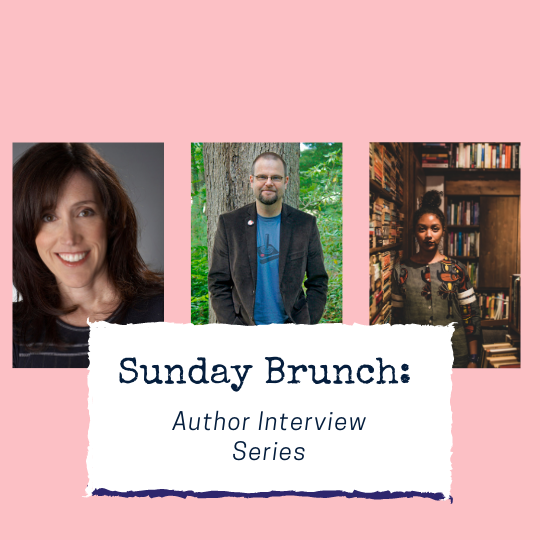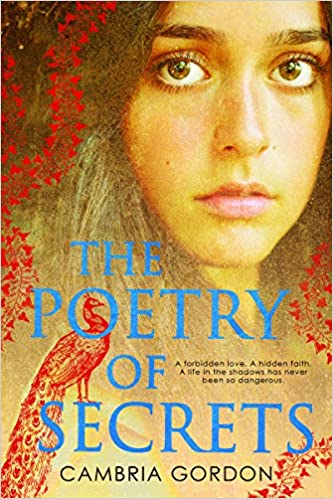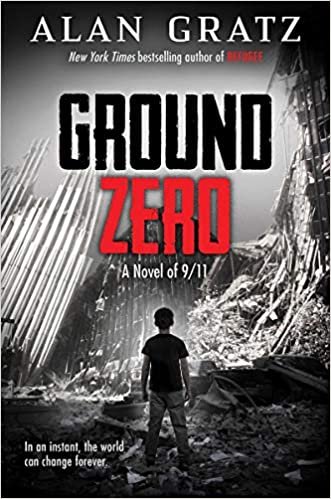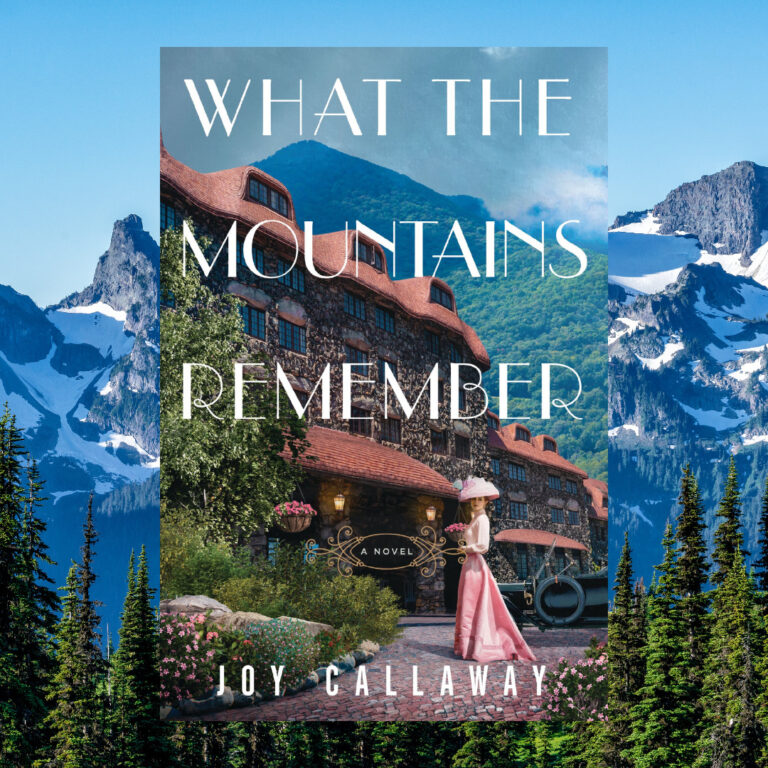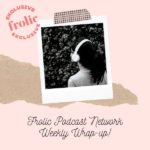[Note from Frolic: Our resident YA expert Aurora got the chance to chat with authors Cambria Gordon, Alan Gratz and Safia Elhillo and ask them a few questions each. Up first, Cambria Gordon.]
Aurora: What was your inspiration behind The Poetry of Secrets?
Cambria Gordon: In 2016, I moved to Madrid with my family for a year. We traveled throughout Spain on weekends and on school breaks. I saw many churches, a few less mosques, but hardly any synagogues. Yet, in certain cities, there were always “Jewish quarters”, streets demarcated by a symbol that meant Jews once lived there. I began to wonder, what happened to all the Jews of Spain? Why were these neighborhoods devoid of any remnants other than the occasional Hebrew letter etched into a brick in a modern building? I hadn’t studied the Inquisition when I was in school in Los Angeles so I didn’t know the history. I read all I could, both fiction and non-fiction about this time period. And like I always do whenever I think of the past, I imagined myself living there. I asked myself what would I have done if I were a Jewish teenage girl in medieval Spain and fell in love with the wrong boy. Would my religion matter to me? Would I defy my family? What would it feel like to be a minority in a country ruled by Church and Crown? The story unfolded from there.
Tell us what to expect from this book.
Late 15th-Century Spain was a Christian world where it was dangerous to be a Muslim or a Jew. Many converted in order to be accepted, though they were never secure. Queen Isabel and King Ferdinand formed The Inquisition in order to root out heretics – anyone who might still be practicing their religion of origin or “judaizing”. Inquisition spies were constantly watching for slip-ups. Neighbors turned in fellow neighbors. The accused were taken in for questioning and many were burned at the stake. The Poetry of Secrets is told from both Isabel and Diego’s point of view. Isabel is a converso, born Jewish, but became baptized. Her family are crypto-Jews, practicing their religion in secret. She wants to be a poet, and certainly not marry the loathsome man she is betrothed to: an official in the government, twice her age. Diego is the son of a nobleman, an “Old Christian” of pure blood. He is a painter and wants to apprentice in an artist studio, but must fulfill his familial duty as a land owner and tax collector. Their relationship cannot happen. But of course, it does. Themes of feminism, otherness, loyalty, liberty and the existence of God are interwoven between knife battles, gypsy tales, stolen kisses, poetry readings and torture. Dear reader, you will not be disappointed!
Why do you feel YA books with powerful and unique themes are so popular and have such a voice right now?
I think YA protagonists are much more interesting than adult protagonists because of all that drama. Everything is heightened when you’re a teenager. An Instagram post of a party you’re not invited to can feel like the end of the world. So an author can go there, can get to that really intense place with their characters and it’s believable, even though it’s fiction. Yet, real life is so strange right now. There is climate change, a pandemic, racial turmoil. Reality almost seems dystopian. So reading a story that takes place during one of the worst times in history and seeing a strong character survive this can actually bring hope for us today. If he/she/they can do it, so can I.
What’s next for you in the bookish world?
I am currently working on a YA that alternates between present day and 19th century Berlin. It is about two female musicians who live in two very different worlds, and how the experience of one influences the choices of the other.
Who is your current favorite writer? Why?
I read a lot of both adult and YA fiction. I think Ruta Sepetys is an excellent writer of cross-over fiction. Fountains of Silence brought 1950’s Spain to life for me. Her line, “The snapping fingers of Madrid” is the best description I’ve ever heard of that city. And it has an excellent love story. For pure YA romance, I really like Jennifer E. Smith. Field Notes on Love is my favorite. It’s like “It Happened One Night”, the Clark Gable movie that I tried to write as a contemporary YA and couldn’t. Jennifer did.
Any writing advice for aspiring writers?
Don’t despair! It took me 27 years to sell my first novel. I quit many times. Seriously. I kept thinking, why aren’t my books getting published? I’d ignore my computer for a few months, but something always drew me back. A new idea would bloom and I had to write it down. Turns out writing was my happy place. I realized that it’s about process more than the final result. If you love doing it enough (and also hate it, LOL, because it is definitely hard) that’s what matters.
Up next, Alan Gratz!
Aurora: What was your inspiration behind Ground Zero?
Alan Gratz: My middle school readers often ask me to write books about different topics they’re interested in, and the number one request I’ve gotten over the years is to write a book about the terrorist attacks on September 11, 2001. 2021 will mark the twenty year anniversary of 9/11, which is kind of a stunner if you haven’t thought about it already. To me it feels like it was both forever ago and like it happened only yesterday. But the thing those of us who lived through that day have to remember is that September 11th happened before middle schoolers were born, and for most kids, anything that happened before they were born is ancient history. My own daughter is eighteen years old this year, and going off to her first year of college, and she was born the year after 9/11. If ever there was a time for me to tackle a book about 9/11, 2021 seemed to be the year to do it.
I tried once, perhaps six or seven years after 9/11, to write a story about that day for what became my 2009 novel The Brooklyn Nine. What I quickly realized was that the wound was still too raw for me and for my editor at the time, who had been in New York City when it happened. What I ended up writing was a story not about that day, but about a kid trying to find purpose in his life again after a house fire and a debilitating leg injury—a metaphor, of course, for the way I and so many other Americans had trouble finding motivation and joy after the heartbreak and devastation of 9/11. I was ready to write about recovery then, but not about the trauma itself.
I’m ready now. Not just to write about that day, but what’s happened in the twenty years since. And young readers are ready to read about it. Too often, the adults in their lives are still living with the scars of that day, just as I couldn’t write about it ten years ago. I also think there’s a widespread but often unspoken understanding that we screwed up our response to 9/11, both in the days and months that followed, and in the two decades since. The end result is that a lot of American adults just don’t talk about 9/11. So kids have heard about the attacks, they know the basic facts about that day, but they haven’t been able to dig any deeper. They don’t know what it felt like to watch the Twin Towers come down that day, or what life in America was like before 9/11, and how that day changed us. This year I was finally ready to write that book.
Please describe the content of Ground Zero.
Ground Zero is the story of two different kids, one nine, one eleven. Brandon, the nine-year-old, is an American boy who is in the north tower of the World Trade Center when the first plane hits on the morning of September 11, 2001. Reshmina, the eleven-year-old, is an Afghan girl whose village becomes a battleground between the United States Army and the Taliban on September 11, 2019—part of a war we’re still fighting, nearly twenty years later, because of the events of 9/11. Told in alternating chapters, the novel follows both young people as they try to survive.
Tell us what to expect from this book.
I hope Ground Zero will show young readers the realities of 9/11 and the resulting War in Afghanistan, and lead them to question the origins and legacies of both. That was an important part of it for me—to not just write about that day, but about the twenty years since.
Why do you feel books with powerful and unique themes are so popular and have such a voice right now?
More and more, middle grade readers are choosing to read books like mine that tackle social issues because the social issues have come to them. They’ve been going through Active Shooter drills since they were in elementary school. They have refugees and immigrants as classmates. They hear racist and intolerant rhetoric from political leaders on the news. They see police in communities across the United States killing Black people and attacking protestors. Middle grade readers don’t have the luxury of thinking about home and school and the neighborhood anymore. They are shaping their views of the larger world right now, in grade school, because the world is forcing them to. I think that’s why middle schoolers in particular have responded so enthusiastically to my books. Because beyond writing a story they can’t put down, I’m also tackling questions they themselves have about the larger world.
What’s next for you in the bookish world?
I’m currently writing the script for what will be a graphic novel version of my novel Refugee. After that, I’m going to write a novel about climate change for middle grade readers.
Who is your current favorite writer? Why?
Jason Reynolds has been an insta-buy for me for a few years now. I love everything he writes. His middle grade track series, including the books Ghost, Patina, Sunny, and Lu, are great. The book he wrote five years ago with Brendan Kiely about the effects of police brutality on a community, All American Boys, is unfortunately as important and relevant today as it was then. And Long Way Down, a novel that spans just sixty seconds of a boy’s life as he tries to decide if he’s going to murder the guy who killed his older brother, is simply brilliant.
Any writing advice for aspiring writers?
Read a lot and write a lot! That’s really the only way you get better—but studying what others have done, and by practicing doing it yourself over and over again.
Last but not least, Safia Elhillo!
Aurora: What was your inspiration behind your most recent novel?
Safia Elhillo: I’ve been obsessed for a long time with the idea of alternate or parallel selves, especially in the context of immigration or diaspora—that other self that could have existed without that sort of geographic rupture. So for this novel, with a little bit of magic, I wanted to see what kind of story could emerge if I made my protagonist’s alternate self real and have them interact. The novel started out as a loose poem I’d written a few years ago, but once I was finished writing that poem I realized I had more to say than could be contained in the space of a single poem.
What character in this novel do you most relate to and why?
I’m probably not supposed to have favorites but my favorite character is Haitham. It isn’t so much that I see myself in him—I see so many of the people I love in him, his humor, his sweetness, how even when he fails it wasn’t for lack of trying.
Why do you feel books with powerful and unique characters are so popular and have such a voice right now?
I think no group of people is a monolith, so it’s really exciting to have all these vastly different characters being represented to start to populate the world of books with characters that reflect the vast range of people reading those books.
Please describe the content of your latest read and what can readers expect from it.
Nima grows up obsessed with the myth she’s made of the country she and her mother left behind, and of the alternate self she could have been if she’d only grown up back home—and her obsession makes both the other place and the other girl, real. It’s in verse and full of old golden-era Arabic-language pop music, and though it deals with some heavy topics I think it has lots of little bright moments and laughs.
What’s next for you in the bookish world?
I’m finishing up a book of poems called GIRLS THAT NEVER DIE which is forthcoming from One World/Random House, and also working on a still-untitled second YA novel-in-verse!
Who is your current favorite writer? Why?
I will forever be obsessed with Anne Carson—her work has given me so much permission in its strangeness and precision and obsession. Her novel-in-verse, Autobiography of Red, is one of my all-time favorite books and was on my mind a lot as I was making my own novel in verse.
Any writing advice for aspiring writers?
Read, read, read! And pay attention to the things you find yourself responding to in your reading—your taste as a reader contains lots of information about your voice as a writer, I think.

